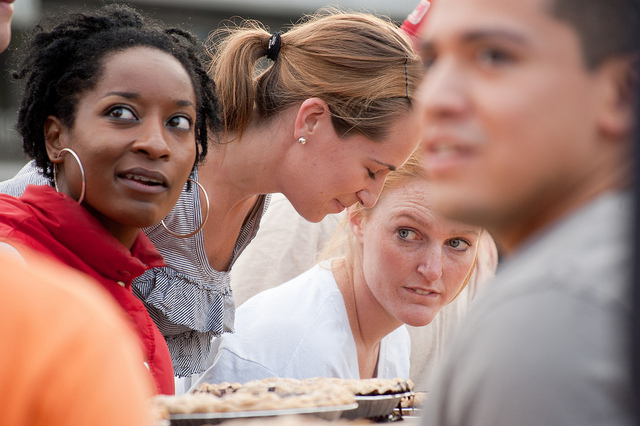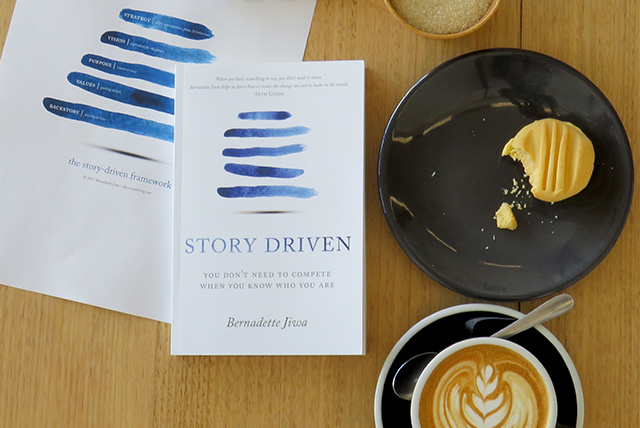Unlock the Magic in Your Story Now
Get the Free 20 questions to Ask Before Launching Your Idea workbook when you sign up for occasional updates.
Get the Free 20 questions to Ask Before Launching Your Idea workbook when you sign up for occasional updates.
Articles filed in: Success
The Measure Of Greatness
filed in Success
 I will never forget the first assembly at my children’s school in Australia. Our family had newly migrated to Perth, Western Australia. We wanted to settle our boys as quickly as possible into their new life. So, much to our ten-year-old’s disgust, they were in new schools within two weeks of our arrival. There we were on a sunny, but brisk August morning (still trying to get our heads around that fact that it was not summer, but winter in Australia), at our local primary school. We were invited to stand and sing the national anthem by the year six student hosting the assembly. This was new to us. In the countries where we were born and raised we sang the national anthem at big public events or on more officious occasions.
I will never forget the first assembly at my children’s school in Australia. Our family had newly migrated to Perth, Western Australia. We wanted to settle our boys as quickly as possible into their new life. So, much to our ten-year-old’s disgust, they were in new schools within two weeks of our arrival. There we were on a sunny, but brisk August morning (still trying to get our heads around that fact that it was not summer, but winter in Australia), at our local primary school. We were invited to stand and sing the national anthem by the year six student hosting the assembly. This was new to us. In the countries where we were born and raised we sang the national anthem at big public events or on more officious occasions.
When I was growing up in Ireland we learned the national anthem is Irish and to my shame, I still struggle to recall what all the words mean today. In the UK where our sons were born, we had to sing ‘God Save the Queen’ once or twice in fifteen years. And yet here we were, two weeks into our new life learning what it meant to be Australian. Every child from the age five up knew the words to the national anthem. They were not just mouthing those words. They were singing them with gusto—like they meant them. It brought tears to my eyes. Hearing it still does to this day. Our family never takes the sense of belonging to a country that welcomes people and to a culture that values generosity and fairness for granted.
In the scheme of things going on the world today, sportsmen attempting to cheat in a cricket match seems trivial. But the incident involving Australian cricketers playing in South Africa at the weekend has caused more than a stir back home. It has gotten under our skin and into our hearts—challenging our sense of who we think we are.
The way the most respected members of our sporting community have represented us on the world stage is not how we as a nation see ourselves. We pride ourselves on being fair and playing fair, on doing the right thing for the collective good over gaining a short-term advantage. Our sportspeople are admired and acknowledged for what it takes, not just to get to the top of their game, but to stay there. We are proud when we win, but we are prouder of the way we win. We understand that above all it’s a privilege to have a place on the field. The backlash is a sign of our strong culture and beliefs about what’s fair and right.
A culture with a strong set of values is the backbone of every country, community and company. The shared identity and common goals of any group are what enables it to thrive when we identify more with being winners than contributors our focus shifts. We are driven by short-term goals to create a near-term advantage. We lose sight of what’s important for the prosperity of the group in the long run. We forget that ‘greatness’ is three dimensional and throw our legacy under the bus.
We’ve all seen how a legacy can be damaged or destroyed in the business arena too. Great leaders in any arena are great not just because they hit more runs out of the park, but because they give us something to believe in and belong to. They show us the best of us, reflecting that what we do when no one is watching is who we are.
As James Carse alludes to in his brilliant book, Finite and Infinite Games. The match might be finite, but the game is infinite. It’s our job to do everything in our power to earn the privilege to play again tomorrow.
Image by cmrlee
How To Fill The Gap That’s Yours To Fill
 No bookstore can stock more books than Amazon. No local clothing designer can launch a new range faster than Zara. No artisan chocolatier can sell chocolate cheaper than Cadbury.
No bookstore can stock more books than Amazon. No local clothing designer can launch a new range faster than Zara. No artisan chocolatier can sell chocolate cheaper than Cadbury.
If there’s nothing your bigger, faster, cheaper competitors can’t do, how will your business keep up? How will you survive, let alone thrive?
Your sustainable advantage comes, not by obsessing over what your competitors can’t do, but by doing what they won’t do to delight customers. That gap is yours to fill.
That’s how Amazon became Amazon—by investing in and doing the things other retailers didn’t do. And it’s how you will build a business you’re proud of as you create the future you want to see.
Image by Shinya Suzuki
Big Enough
 Conventional business wisdom suggests that success is dependent on achieving scale. We’ve come to equate fulfilling our potential with being number one—having the biggest piece of the pie. In our quest for success, we sometimes forget to question how much pie is enough.
Conventional business wisdom suggests that success is dependent on achieving scale. We’ve come to equate fulfilling our potential with being number one—having the biggest piece of the pie. In our quest for success, we sometimes forget to question how much pie is enough.
Exceeding the optimal amount of pie has consequences. We fail to deliver on expectations when we bite off more than we can chew. We become preoccupied with the acquisition of customers instead of working to keep the customers we have. We obsess about sustaining an advantage and forget to celebrate what we’ve accomplished. We move too fast or too soon. We don’t reflect on the difference we’re making. And we stop enjoying the journey because we’re always chasing a bigger piece of the pie.
You don’t need every customer. You don’t have to go after every single opportunity. You don’t need to be bound by traditional metrics of success. You can choose to be big enough.
Image by srietzke
Create The Future You Want To See

The best investment I ever made in myself and my business was buying a copy of Seth Godin’s book, Purple Cow. Seth taught me that remarkability was a choice. Just as business owners don’t work just to pay the bills, writers don’t write just so they can eat. They write to create the change they want to see in the world. That’s what we’re all here to do.
My new book, Story Driven: You don’t need to compete when you know who you are, published a few days ago. It’s my most important work. That’s why I’m launching the Kindle eBook edition at the special price of 99 cents this week. I’m not only inviting you to invest in yourself by buying a copy. I’m encouraging you to invest in your friends and colleagues by gifting the book to them.
You can buy and gift Story Driven today on Amazon.com, or if you’re in Australia, Amazon.com.au and the UK, Amazon.co.uk
(It’s available in all international Amazon stores. Search your local Amazon store by title and author).
We get to choose the future we want to see and the chance to create it together.
Thanks for giving me a reason to write.
Image by Kieran Jiwa
The Best Of Us
filed in Storytelling, Success
 Our youngest son got his first paying job at a fast food restaurant this summer. He’d walked up and down the street handing out resumes for days and got a single call back. He was interviewed over the phone and invited in for trial one evening. He got the gig. Twenty dollars an hour and as many shifts as he could handle taking orders and wiping tables late into the night. The shifts ran from the evening until the early hours of the morning. Sometimes he was barely in bed before dawn. But he stuck with it for the entire summer without complaining. Then one day he mentioned he hadn’t been paid for a couple of weeks. His boss owed him over a thousand dollars in back pay.
Our youngest son got his first paying job at a fast food restaurant this summer. He’d walked up and down the street handing out resumes for days and got a single call back. He was interviewed over the phone and invited in for trial one evening. He got the gig. Twenty dollars an hour and as many shifts as he could handle taking orders and wiping tables late into the night. The shifts ran from the evening until the early hours of the morning. Sometimes he was barely in bed before dawn. But he stuck with it for the entire summer without complaining. Then one day he mentioned he hadn’t been paid for a couple of weeks. His boss owed him over a thousand dollars in back pay.
My husband and I reacted as many parents would. We were suddenly on guard, wary that our child (who is his own man now) wasn’t exploited. We offered unhelpful suggestions about what he should do next, telling him he probably shouldn’t work more shifts until he was paid. Our boy didn’t blink. Not showing up wasn’t an option. He’d committed, they were short staffed. He wouldn’t let his other team members down.
I remember when he was seven years old and winning prizes for being top in everything at school. The quiet, watchful blonde kid with deep brown eyes, who seemed to make no effort and yet always come out on top. After an assembly where he was awarded a medal for the best piece of creative writing in the state, one of the class Mums approached me. She had two questions. ‘What does he read? What do you feed him?’ I laughed until I realised she wasn’t joking.
People who don’t know our son judge him by his academic performance. He’s evaluated by his grades and ability to ‘achieve’ in the conventional sense of the word. What they don’t often see is the real measure of him. His kindness. His sense of fairness. His tenacity. His wicked sense of humour. His character. The things that can’t be measured. The things that make him, him.
He will probably be picked one day because of how he looks on paper—for his scores or the number of research papers he’s published. Whoever works with him won’t know until later why they are lucky to have him on their team.
Our stories are not defined only by what is seen and known. The imagination can’t always capture the best and the beauty of us.
Image by Robin Jaffray
Now Vs. Next
 We’ve come to believe that the ability to focus on the future is the cornerstone of achievement, success and progress. But we’re in such a hurry to get there we often sacrifice the opportunity to do our best work in this moment. The irony, of course, is that tomorrow’s success is dependent on the groundwork we do today. Begin where you can. Start here.
We’ve come to believe that the ability to focus on the future is the cornerstone of achievement, success and progress. But we’re in such a hurry to get there we often sacrifice the opportunity to do our best work in this moment. The irony, of course, is that tomorrow’s success is dependent on the groundwork we do today. Begin where you can. Start here.
Image by Javi
Who Will You Impact?
filed in Storytelling, Strategy, Success
 The bus headed back over the Golden Gate Bridge as we neared the end of our tour of Sausalito. The driver pulled over at the second last stop and turned off the ignition so that he could ‘address his guests’. Then Dwayne Johnson (the man who had the name before the celebrity who made it famous), stood facing us, looking out towards the iconic bridge in the background.
The bus headed back over the Golden Gate Bridge as we neared the end of our tour of Sausalito. The driver pulled over at the second last stop and turned off the ignition so that he could ‘address his guests’. Then Dwayne Johnson (the man who had the name before the celebrity who made it famous), stood facing us, looking out towards the iconic bridge in the background.
He explained that he loved the city he had called home for almost sixty years. He told us he regarded his job as both a pleasure and a privilege. And then he began to evangelise about the stunning monument we’d just driven across.
‘This bridge will be the standard for every bridge that will ever be built,’ he said. ‘They say Disneyland is magical. No, this bridge is magical. Even guys take selfies on this bridge.’
Dwayne explained that although it was a cold day, we were in San Francisco at a beautiful time to experience it. On foggy days much of the bridge is obscured from view. He told us that he drives across it every day, but he walks across it at the weekend whenever he can. And then he invited us to get off the bus and do the same, even though we didn’t have to because the bus was going back across it anyway.
‘Maybe you think it’s too cold or you’ll do it next time. But you don’t know if you’ll be back. And one day, when you get home, and you’re showing the photos of your trip to friends they will ask you if you walked across the bridge. Your trip will be defined by that.’
Then Dwayne stood back and gave us a moment to decide. Half of the passengers (many of whom would have left a tip in the tip jar on the dashboard at the end of the trip), left the bus to walk across the magnificent Golden Gate Bridge, as our guide got back in his seat and turned the ignition.
Dwayne Johnson doesn’t own Big Bus Tours. But he does own the power he has to touch people’s lives every day. Who will you impact today?
Image by 305 Seahill
Meaning And Work
filed in Success
 Yesterday I met James on a bitterly cold day in San Francisco. He is employed by the City and works close to the magnificent City Hall. It’s hard to describe James’ enthusiasm as he guides each visitor through the facility he manages. He is empathetic and professional—intructing people on how to use the facilities and diligently recording the time and duration of visits. James is proud that the City will be using this data to improve how it serves people. He explains that he interviewed for the position and moved to San Francisco to take the job he now loves as a Pit Stop Monitor.
Yesterday I met James on a bitterly cold day in San Francisco. He is employed by the City and works close to the magnificent City Hall. It’s hard to describe James’ enthusiasm as he guides each visitor through the facility he manages. He is empathetic and professional—intructing people on how to use the facilities and diligently recording the time and duration of visits. James is proud that the City will be using this data to improve how it serves people. He explains that he interviewed for the position and moved to San Francisco to take the job he now loves as a Pit Stop Monitor.
‘I used to be in jail, you see, and now I get to learn and contribute and meet all kinds of interesting people each day.’ he says, producing hand sanitiser with a flourish. ‘You might as well make the visit worth your while.’
As I walk away I can’t help wondering what the world would be like if every one of us shared James’ worldview about our work and our contribution.
Image by Paul Sableman
You Can’t Mimic Your Way To Success
 The Louvre is the most visited art museum in the world. It welcomes more than seven million visitors each year. Six million of those visitors are there to see the world’s most famous work of art, the Mona Lisa. An estimated 16,000 visitors a day jostle in front of the 77 cm x 53 cm painting of Lisa Gherardini, many ignoring the other magnificent Venetian Renaissance masterpieces in the museum’s Salle des Etats.
The Louvre is the most visited art museum in the world. It welcomes more than seven million visitors each year. Six million of those visitors are there to see the world’s most famous work of art, the Mona Lisa. An estimated 16,000 visitors a day jostle in front of the 77 cm x 53 cm painting of Lisa Gherardini, many ignoring the other magnificent Venetian Renaissance masterpieces in the museum’s Salle des Etats.

We live in a culture of comparison. This is an era where it’s not only possible to see what everyone else is thinking, saying and doing—it’s almost impossible to avoid exposing yourself to other people’s game plans. Doing what worked for someone that’s gone before you feels less risky. While mimicry can feel like the safe option, I’d argue that it’s not going to help you to do the work you’re most proud to have done.
In a world of comparison, originality is underrated. Breakthroughs depend on a person or group of people with a particular set of skills and perspectives, at a unique moment in time, turning left when everyone else is going right. It’s impossible to replicate those circumstances. People are not craving the next Mona Lisa, and they’re not waiting for the new Banksy. They are looking for someone who can lead with their unique voice and vision to create the future we want to see.
It’s better to aim for doing work that matters to you for the people you care about serving than to invest your time retracing someone else’s path to success. So apply your blinkers and reflect on what it is that you can change in your way instead. Your time and your gifts are too precious to waste on becoming a carbon copy.
Images by Thomas Ricker and Brett Davis
The Number That Matters
filed in Strategy, Success, Worldview
 Every so often I look at the list of readers who have subscribed to my blog but have stopped opening the emails they signed up to receive. When I see that they’re no longer interested, I unsubscribe them. I’ve personally done this almost 10,000 times over the past seven years. It’s harder than you think at first because we’ve been conditioned to believe that the only number that matters is the biggest one. What’s more important to me, and I’m guessing you too, is to reach and serve the people I can make the most difference to. That means respecting the choice of the people who are no longer engaged.
Every so often I look at the list of readers who have subscribed to my blog but have stopped opening the emails they signed up to receive. When I see that they’re no longer interested, I unsubscribe them. I’ve personally done this almost 10,000 times over the past seven years. It’s harder than you think at first because we’ve been conditioned to believe that the only number that matters is the biggest one. What’s more important to me, and I’m guessing you too, is to reach and serve the people I can make the most difference to. That means respecting the choice of the people who are no longer engaged.
What would our world look like if we doubled down on only making work for the people we can move and only paid attention to the things that have the power to change us?
Image by Karina Yeznaian